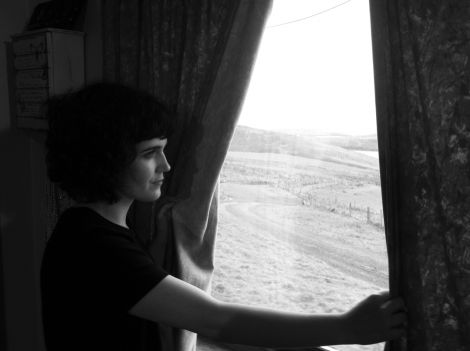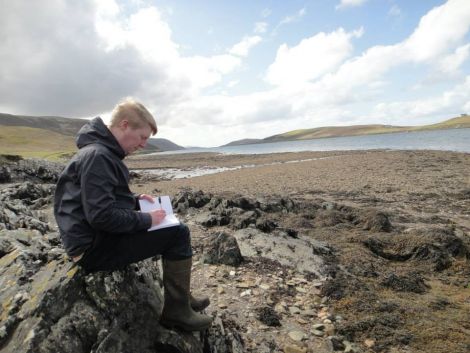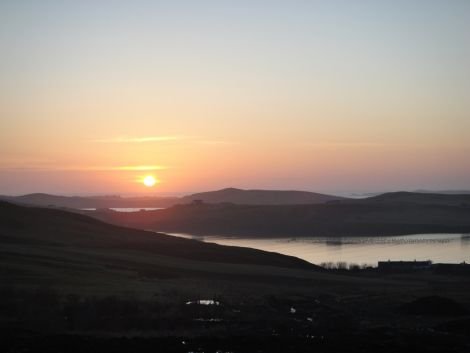Reviews / Eunson’s ‘peaceful and stirring’ film debut
YOU MIGHT expect that a first time film maker would try something short to begin with, writes Louise Thomason. Or at the very least, a project that had a clear objective – something you could break into manageable chunks; a definite plotline, a story with a beginning, middle and an end, or actors and sets.
Not so for local poet and writer Bruce Eunson, who plunged headfirst into filmmaking with ‘Dis Quiet’, a brave and reflective 30 minute short in Shetland dialect was shown at Mareel last weekend as part of the Screenplay film festival.
I get the feeling that for Eunson, the director and executive producer, the desire to tell this particular story was more important than making a film just for the sake of it, the team behind it being chosen early on its development.
The film explores themes of existentialism: living a solitary life; being a writer. Of our relationship with our surroundings, the desire to leave and the magnetising pull to stay.
It is told through the words of Portuguese poet, José Fernandes, which were translated into Shetland dialect by poet Samuel Laurence, and then adapted for screen by Eunson. This is a complex and abstract idea for a film, but it’s a clever one: the range of linguistic filters lends a quality to the poetry, as if each version leaves something of itself.
The character of Laurence is portrayed by Eunson and, in the second half of the film, Ria Moncrieff, both of whom we observe writing, walking, looking out to sea, even sleeping, while the poetry is spoken as a voice over.
Bringing a female perspective to a male character creates a genderless persona which widens the appeal of the words that are being spoken: they are not about any one place, or person, but can be transferred and therefore resonate with many people.
Become a member of Shetland News
From a technical point of view, adding the female perspective also creates a subtle break in the film, perhaps encouraging the audience to listen afresh to the words.
Dis Quiet is bare, but beautiful. Sweeping shots of the landscape of Shetland, at various times of day and in various seasons, are coupled with shots of Eunson or Moncrieff, sometimes walking, or looking out at the shoreline, or writing the words that are being spoken.
While the narrative is captivating, a key part of the film’s success is the music. The score was written by London John, aka Scalloway musician Loudon Bruce. Written (apparently at times on the hoof) to the words of the poetry rather than the scenes on screen, the compositions support the film in exactly the right way, as though lending a guiding hand rather than pulling the scenes in any set direction.
Simple, haunting elements of the score, combined with the sounds of waves, enhance the rawness both of the landscape and the narrative, while pared back guitar lends at times uplifting and in others, melancholy elements.
Part of my enjoyment of the film comes from its lack of familiar boundaries. It is never really clear when it’s set, or when Samuel Laurence was alive, or who he was. That’s ok, as the writing is timeless, and the words don’t need to be categorised by time.
I love that the film is contemporary, but in Shetland dialect. It is descriptive, of course, but romantic in a way that I had not – shamefully, perhaps – imagined Shetland dialect could be.
It is not a nostalgic romance. It tugs at something that creative people, and perhaps specifically islanders, feels at certain times: a questioning self doubt and a desire to capture the beauty around you, but with a nagging feeling that you can’t possibly, and a suspicion that you shouldn’t really try. This is summed up by a question which features in lines written early on in the film: “whit am I döin wi me life?”
This film is ambitious. Its wide reaching yet interlinked sources of inspiration combine beautifully to create something that is both peaceful and stirring, and surprisingly moving.My only slightly negative observation, which I am hesitant to include here, is that I feel the cinematography could have been more imaginative. The idea behind the film is so thought-provoking, the language so inspiring and lyrical, that the extremely literal way it has been interpreted feels, to me, as though there were some if not wasted, then missed, opportunities. Conversely, perhaps the very simple way the film is shot allows the audience to focus on the words and music.
This film is ambitious. Its wide reaching yet interlinked sources of inspiration combine beautifully to create something that is both peaceful and stirring, and surprisingly moving.
Louise Thomason
Become a member of Shetland News
Shetland News is asking its many readers to consider paying for membership to get additional features and services: -
- Remove non-local ads;
- Bookmark posts to read later;
- Exclusive curated weekly newsletter;
- Hide membership messages;
- Comments open for discussion.
If you appreciate what we do and feel strongly about impartial local journalism, then please become a member of Shetland News by either making a single payment, or setting up a monthly, quarterly or yearly subscription.































































